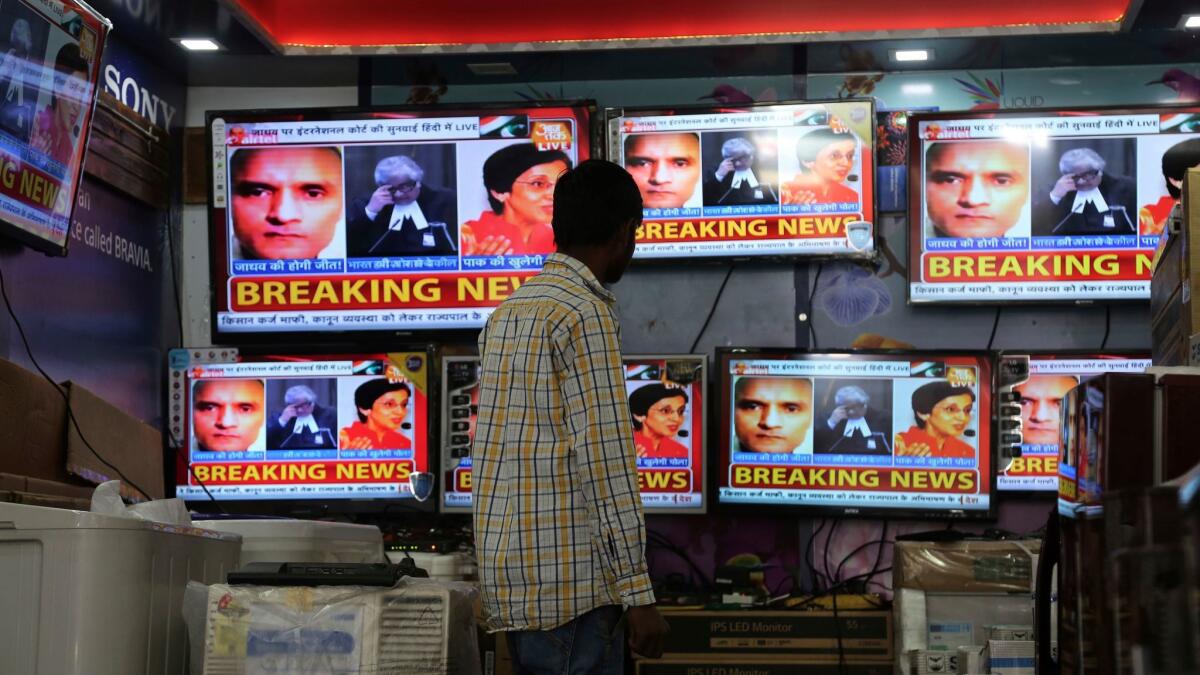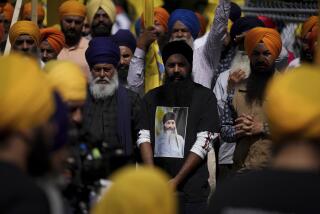In a courtroom at The Hague, India and Pakistan spar over the fate of an alleged spy

- Share via
Reporting from Mumbai, India — In a rare direct confrontation on the international stage, India and Pakistan sparred Monday at a United Nations court over a death sentence issued to a retired Indian naval officer whom Pakistan calls a spy.
India approached the International Court of Justice at The Hague, Netherlands, seeking a stay of execution for Kulbhushan Jadhav, convicted of espionage last month by a Pakistani military court.
Lawyer Harish Salve, representing the Indian government at the daylong hearing that was broadcast in both countries, said Pakistan had prevented Indian authorities from meeting with Jadhav.
He was arrested in March 2016 in the southwestern province of Baluchistan in what Pakistan described as a counter-terrorism operation. India has denied that Jadhav is a spy, saying he was kidnapped from Iran, where he was traveling on business, and has been framed by Pakistan.
The case is the latest flashpoint in India-Pakistan relations and comes as the two nuclear-armed rivals trade accusations over worsening violence in the disputed territory of Kashmir. Indian armed forces are accused of using excessive force to quell a civilian uprising in the Himalayan territory, which is divided between the countries but fully claimed by both.
India has consistently refused to take its disputes with Pakistan to an international forum. But New Delhi this month took the unusual step of appealing to the international court, the judicial branch of the United Nations, to suspend Jadhav’s death sentence.
The Indian government argued that Jadhav’s military trial was “farcical” because he was given a lawyer only toward the end of the trial and Pakistan had not shared details of the proceedings.
“The basic rights of Jadhav were thrown to the winds,” Salve said in court, arguing that he was convicted on the basis of a forced confession.
Pakistan countered that Jadhav was an agent of the Research and Analysis Wing, the Indian spy agency, and was carrying a passport with a false name at the time of his arrest. Lawyer Khawar Qureshi, representing the Pakistani government, said India was “unable or unwilling” to explain the discrepancy.
Qureshi said that espionage was a matter of Pakistani national security and therefore out of the international court’s jurisdiction.
The hearing concluded Monday, with a judge saying that the 15-judge bench would issue a ruling as soon as possible.
India has fought three wars with Pakistan since both countries gained independence in 1947, but has been reluctant to invite international bodies to weigh in on the dispute. The last time India approached the international court in a case involving Pakistan was in 1971.
In 1999, Pakistan petitioned the court after the Indian air force shot down a Pakistani maritime reconnaissance aircraft in the Kutch region that straddles both countries, killing all 16 naval personnel on board. The court dismissed Pakistan’s claim, saying it did not have jurisdiction in the matter.
The Jadhav case has become a matter of national pride and was being closely watched in both countries.
In India, experts said the case could open up a new avenue for putting pressure on Pakistan, which it accuses of supporting Kashmiri militant groups that have increased attacks against Indian forces.
“Previously, there was a reluctance to internationalize such issues,” said Dhruva Jaishankar, a foreign policy fellow at Brookings India, a think tank. “If the ICJ rules in favor of India, it will be a major embarrassment for Pakistan. If Pakistan wins the case, India does not have much to lose.”
Jaishankar said the Jadhav case has taken on added resonance as India and Pakistan tussle over multiple issues.
India has spoken out against China’s multibillion-dollar investment in Pakistan as part of China’s transnational “Belt and Road” infrastructure initiative, and boycotted a summit on the issue in Beijing over the weekend. Pakistan has used the upsurge in violence in Kashmir to needle India over its policies in the disputed region.
“None of these are going in a positive direction as far as India-Pakistan relations are concerned,” Jaishankar said. “Jadhav is as much of a symptom as a cause of it.”
Parth M.N. is a special correspondent.
ALSO
Nine killed in Indian-controlled Kashmir as violence grows in the disputed territory
India and Pakistan are clashing again over Kashmir. Here’s what you need to know
Young men in Kashmir are disappearing from their homes. Friends say they’re going to fight India
More to Read
Sign up for Essential California
The most important California stories and recommendations in your inbox every morning.
You may occasionally receive promotional content from the Los Angeles Times.










